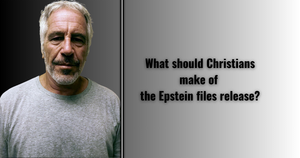Substance abuse has been a major issue in the United States for decades, but with the increase in legal availability of certain drugs and the social popularity of drug usage, chemical dependency may be easier than ever to fall into in modern society. What does the Bible say about drug addiction?
One of the most prevalent issues in modern society is addiction. While the term can be used to describe any compulsive, self-destructive behavior that a person has difficulty moving past, it is most commonly used to describe uncontrollable reliance on drugs, alcohol, or other substances.
Drug and alcohol addiction are epidemics, and the combined issue is a plague on the United States of America. According to the 2023 United States National Survey on Drug Use and Health, over 48 million people (around 15% of the population) in the US battled some form of substance abuse disorder in the previous year.
Recent viral videos of people affected by the drug "tranq" outside of Philadelphia and other major cities have brought the drug conversation to the forefront. Though these discussions around the addiction epidemic vary greatly by context (more on that later), almost everyone can agree that addiction puts a person in unrelenting captivity, making each day more devastating than the last. Becoming slaves to masters that alter their brain chemistry, addicts dig themselves into deeper metaphoric holes with each usage, as they become more and more dependent upon substances for a high or even to feel regulated.
Some consider the phenomenon of addiction to be a disease. Others believe it is not a clinical issue at all, but one of self-control. The Bible gives credence to both of these beliefs. In this article, we will take a look at some facts about addiction (specifically as it pertains to drugs and/or alcohol), how the political Left and political Right in America skew the narrative around the issue, and how God's Word applies to the entire conversation.
Some facts about drug addiction in America
All statistics below are from studies conducted by drugabusestatistics.org unless otherwise stated.
- As many as 51.2% of people 12 or older in the United States have used an illicit drug at least once.
- In 2022, 24.9% of Americans of the same age used an illegal drug or intentionally misused prescription drugs. Even if taking marijuana out of the equation, LSD (11.6% of the population), opioids (3.2%), and prescription pain medicine (3.1%) are commonly tried dangerous substances.
- 21.5% of people who consumed alcohol in the last month self-report an addiction, and 38.6% of people who have ever used illegal drugs self-report a drug abuse issue.
- Since 1999, over 1.15 million people have died directly from drug overdoses in America.
- According to the research department at Statista, the federal cost of fighting drug abuse has risen to over $44 billion per year.
Some observations about drug addiction in America
- 40 of 50 states have legalized medicinal marijuana, and 24 have legalized it for recreational use. Alcohol is legal in all 50 states. With a prescription, an endless list of narcotics and opiates is available all over the country, too. As opposed to classic "hard" drugs, some of these have a place in society; however, as they have become easier to get, they have become easier to abuse.
- Cultural and societal acceptance of certain substance usage, especially alcohol and marijuana, is at an all-time high. Some pop culture also glorifies the abuse of prescription drugs, over-the-counter substances, and cocaine. All of that desensitizes individuals to the severity of the drug abuse issue, at least as it pertains to particular substances. Those drugs can be dangerous in and of themselves, but they also can lead individuals into deeper drug use, as well.
- For many years, drug addiction was viewed as an issue primarily for economic extremes: people on the low end of the economic spectrum turned to certain drugs, while the financially elite could afford others. The perception was that the middle class was largely untouched beyond young, experimental, recreational drug use that usually did not last. Whether perception matched reality or not, these days, drug addiction is a major problem at every socio-economic level.
How the Left skews the narrative
- Typically, liberal-leaning politicians take a stance on drug addiction that describes the hold it has over individuals as a disease, rather than a consequence of personal choice.
- Former President Joe Biden went as far as to argue that choice is not a factor in drug addiction at all, that it is completely the end result of a disease. "Addiction should be considered a neurobiological disease, not a lifestyle choice," he said.
- New Jersey Congressman Cory Booker is one of many democratic politicians who support the lessening of or removal of prison sentences for non-violent drug arrests. Some, such as Missouri Senator Cori Bush, go as far as to argue for the decriminalization of all drugs.
- Many on the Left argue that tougher penalties don't reduce drug crimes. However, the evidence is inconclusive and can't fully support a reduction or increase in the crime rate following an increase or decrease in penalties.
- Overall, views like this often lack any form of emphasis on personal accountability and an understanding that actions have consequences.
How the Right skews the narrative
- Usually, the political opinion of those on the Right is that drug addiction is mostly (if not completely) a result of personal choice. In this view, addiction is not a disease or a result of difficult circumstances; instead, it is simply an avoidable (albeit tragic) reality that stems from a person making poor choices.
- Since Richard Nixon's "War on Drugs," the Republican Party has supported harsh penalties for drug offenders.
- Secretary of State Marco Rubio is among the conservatives who staunchly oppose legalization, decriminalization, or leniency in sentencing. Former Vice President Mike Pence has said that the United States' stance on drugs should be one of "reducing crime, not reducing penalties."
- Many on the right side of the political aisle (rightfully or wrongfully) use the drug epidemic in America to challenge democrats on issues of immigration and border security.
- Some Republicans argue that tougher legal penalties for drug-related offenses reduce overall drug crime. However, the evidence is inconclusive and can't fully support a reduction or increase in the crime rate following an increase or decrease in penalties.
- At times, the emphasis on personal responsibility in drug addiction leads individuals to withhold empathy and compassion for others who are trapped in drug addiction.
What the Bible says
As usual, what God's Word has to say isn't quite as simple as picking a political side. There is validity in parts of the arguments on both ends of the political spectrum, and both major parties in the United States miss the mark at times, as well. Scripture attests to addiction being both a result of poor moral choices and being similar to a disease. Let's take a look at what the Bible says.
*It is worth noting that alcohol use is not always sinful (1 Timothy 5:23, Psalm 104:15). The same can be said about some drug use (such as medicinal marijuana for certain medical issues like glaucoma or prescription medicines for pain or depression). Some other drugs should always be viewed as off-limits, and all of these substances can be abused.*
First, the Bible is very clear on "drugs."
While the word "drug" is not used in the Bible in a literal sense, drug use is addressed in the pages of Scripture. Both in the various passages on alcohol and other verses regarding the mind, God's Word repeatedly confirms the importance of a person being clear-headed, staying sober-minded, and maintaining self-control.
Believers are commanded in Scripture to be sober in 1 Thessalonians 5:6 and 1 Peter 1:13. A lack of sobriety "takes away understanding" (Hosea 4:11) and can yield unintended consequences (Genesis 9, Habakkuk 2:15).
Self-control is mentioned in the "Fruit of the Spirit" passage in Galatians 5:22-23 and is clearly commanded in Titus 2:6. Being under the influence of drugs or alcohol reduces or even eliminates self-control.
1 Peter 4:7 indicates that the Lord doesn't wish to hear from those who lack self-control or who are not sober-minded, as Peter implores believers to "be self-controlled and sober-minded for the sake of your prayers."
Explicitly in Ephesians 5:18, Galatians 5:19-21, and other places, the Bible condemns drunkenness. Abusing alcohol is also considered "unwise" in Proverbs 20:1 and several other instances in the wisdom books.
It is also sin to willfully engage in unnecessarily dangerous activity, and doing so will result in negative consequences. Proverbs 22:3 says, "The prudent sees danger and hides himself, but the simple go on and suffer for it."
Taking care of the body is an often-neglected command in the Bible, too, something that one cannot do well if using drugs. 1 Corinthians 3 and 1 Corinthians 6 refer to the body as a "temple" designed for the worship of God, Romans 12:1 describes the human body as "a living sacrifice" to the Lord, and 1 Corinthians 10:31 instructs Christians, in a conversation about what to put or not put into the body, to "do all for the glory of God."
Scripture is also very clear on the issue of moral choice.
Getting out in front of a potential question–no, this section will not be the place for a debate on the extent of free will within the bounds of God's sovereignty. Instead, this will address the issue of personal responsibility and choice within sin.
Within the Creation narrative of Genesis 1 and 2, it is clear that the Lord gave his prized creature dominion over other aspects of creation. Within that, He blessed Adam and Eve with the ability to choose. When the man and woman abused that freedom, God punished them, demonstrating the very first instance of personal accountability for poor choices. In Genesis 3, the Lord pronounces the curse of sin, most notably the promise of death in verse 19: "for you are dust, and to dust you shall return."
Adam and Eve were punished because they disobeyed God. That is what sin is. It is a deviation–whether rebelliously intentional or ignorantly misguided–from God's created order and decree. Because of His holy perfection, the Lord cannot allow sin, and that is why there are consequences for making poor choices, none of which are bigger than the fact that sin separates mankind from God.
As this pertains to addiction, Scripture is plain when it speaks on who or what is responsible for a person's sin.
In Romans 1:20, the Apostle Paul writes that all peoples "are without excuse" for their sin, whether they have an explicit understanding of God's Law or not. The Lord has revealed enough of Himself through creation and through the natural morality that he places within each person's heart to hold everyone accountable for their actions. In verse 21, Paul says that this knowledge of God is so attainable that it equates to a person knowing Him, therefore, making every sin against Him akin to one that is an intentional act of rebellion.
Though addiction is a complicated issue that, once it sets in, creates additional factors to consider, it typically cannot begin without intentional, willful choice(s) leading to the addiction.
Though addiction is a product of choice, it becomes an involuntary enslavement.
While it is impossible to deny that almost every instance of substance addiction begins with willful choice, that choice becomes less a part of the equation as time continues. Addiction holds great power over individuals, one that can be compared to slavery.
At a physical level, addiction to drugs and/or alcohol is largely due to chemical dependence. These substances light up the brain's neurotransmitters in such a way that a person cannot help but crave the feeling again. Essentially, those addicted to drugs are slaves, and their masters are whatever substances they can't live without.
Spiritually speaking, the Bible speaks of slavery to sin in a direct way in Romans 6. Paul argues that those who are in sin are actually "slaves to impurity and to lawlessness leading to more lawlessness."
In that sense, addicts are fighting both physical and spiritual enslavement. The only way out completely, Paul says, is a supernatural work of God that brings a person into new life in Christ. "We were buried therefore with him by baptism into death, in order that, just as Christ was raised from the dead by the glory of the Father, we too might walk in newness of life" (Romans 6:4).
In Galatians 4:9, the apostle makes it clear that former sins will still call out to believers, but the Lord changes His people from slaves to sin to obedient children (Galatians 4:3-7).
Addiction is idolatrous.
A harsh reality behind addiction of any kind is that it is an act of worship. Addictive behavior is worshipful because of the premier placement the behavior has in a person's life.
Idolatry occurs when a person is guilty of putting something created in a higher place than the Lord. In doing so, the person, either directly or indirectly, worships the creature rather than the Creator (Romans 1:26).
Therefore, addiction is idolatrous.
In a similar way, Jesus says during His Sermon on the Mount, "For where your treasure is, there your heart will be also" (Matthew 6:21). Anything that dominates the thoughts, actions, words, time, or finances of an individual owns his/her heart. Addiction certainly qualifies.
Like any other form of idolatry, addiction offends God greatly and steals worship that rightfully belongs to Him. As an idolatrous behavior, it also demonstrates a lack of faith in God. Jonah 2:8 says, "Those who pay regard to vain idols forsake their hope of steadfast love." Just like idols made of stone or wood in other cultures, addiction holds no lasting power to satisfy the heart (Isaiah 45:20).
There is hope in Christ for the addict.
Though addiction is sin, and though it is a grievous one that ensnares people in a manner that feels impossible to escape, it is not an incurable disease. Jesus Christ offers full salvation via repentance.
Repentance is a human response, but the Bible is clear that true moral change and heart renewal require divine intervention. That change begins with what Scripture calls the new birth–a radical transformation of a person’s heart and nature through the Holy Spirit.
2 Corinthians 5:17 says, "Therefore, if anyone is in Christ, he is a new creation. The old has passed away; behold, the new has come."
Paul's language in 2 Corinthians is not merely a future look at the physical resurrection that is to come for believers. It is also ontological, meaning that faith in Christ alters a person's current being in a real way. The person who truly repents and believes in Jesus is no longer defined by their previous addiction and past sin. They are not just a “recovering addict.” They are "a new creation" given a fresh start, a Holy Spirit-empowered life, and a justified soul. According to Romans 8:2, Christians have been "set free in Christ Jesus" by "the Spirit of Life."
For the redeemed believer, previously impossible behaviors (such as moving past an addiction and avoiding future temptations) become possible.
Romans 8:3-4 says, "For God has done what the law, weakened by the flesh, could not do. By sending His own Son in the likeness of sinful flesh and for sin, He condemned sin in the flesh, in order that the righteous requirement of the law might be fulfilled in us, who walk not according to the flesh but according to the Spirit."
In being made a new creation that is now empowered by God the Spirit, Christians are called to do good works and to live righteously. "For we are His workmanship, created in Christ Jesus for good works, which God prepared beforehand, that we should walk in them."–Ephesians 2:10.
The Church must confront addiction.
In fighting alongside the lost battling addiction, the Church must be compassionate. Just as the Lord is patient to forgive, so too must Christians be willing to be gracious and merciful with those who need it.
In the rarer cases of true followers of Christ falling temporarily into real addiction, the Church should be a place of accountability and healing. James writes in his epistle in James 5:19-20, "My brothers, if anyone among you wanders from the truth and someone brings him back, let him know that whoever brings back a sinner from his wandering will save his soul from death and will cover a multitude of sins." Believers also cannot coddle another believer who is in sin; they must call them back to Christ. In doing so, they have served the Lord faithfully.
Whether dealing with the lost addict or the saved addict, the Church must stand resolutely on the Truth. The Biblical reality of sin is a needed talking point when explaining one's need for a Savior. Exposing sin may cause pain, but it also provides illumination of the path forward to redeem it.
Only the gospel calls those enslaved by drugs out of their pit and onto solid ground.
Final verdict
Addiction begins with choice(s) and develops into a disease-like enslavement. It is self-destructive, and addictive behaviors can be damaging to everyone around the addict.
Addiction is sinful both because of the nature of substance abuse and because of the idolatry involved. However, it is not a death sentence. There is hope for addicts in Jesus Christ.
2 Corinthians 5:17-"Therefore, if anyone is in Christ, he is a new creation. The old has passed away; behold, the new has come."




